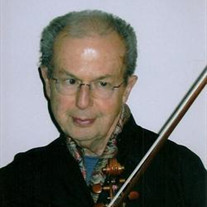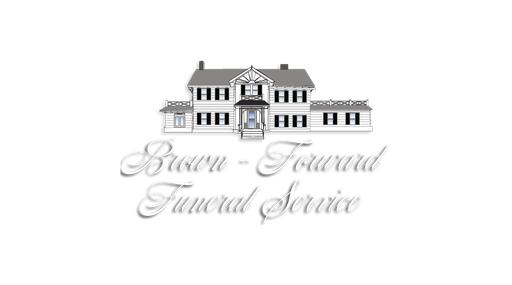

1925
Gino
2013
Gino Raffaelli
June 3, 1925 — January 10, 2013
My father lived his life with great passion and purpose. Whether it was planning a dinner party for dear friends, playing with his grandchildren or organizing a political movement, he accomplished everything with grace and enthusiasm. I encourage all of you to share any memories of my father. He would like nothing more than to know that we are celebrating his life and how much he meant to all of us...Thank you, Gia Shore Gino Raffaelli was known as a peace impresario. The long-time Cleveland Orchestra violinist, Heights Chamber Orchestra concertmaster and international activist died Jan. 10 at Judson Park. He was 87. The dapper, dogged Raffaelli co-founded the local Performers and Artists for Nuclear Disarmament in 1984. He was its first president and held the post until his death. He also started outreach programs for the Cleveland Chamber Music Society, co-founded a international musicians' group and much more. "He was always doing, doing, doing," said Diane Mather, fellow Cleveland Orchestra retiree and PAND co-founder. Raffaelli was a serious bon vivant. He tracked down fine clothes, bought fine art, commissioned music and cooked gourmet fare for benefits at his home in Cleveland Heights. He was also a soft-spoken crusader, standing up both to military might and to feared maestro George Szell. "He was a master of firmness and diplomacy," said David Richardson, a fellow trustee of the Cleveland Chamber Music Society. When he retired from the Cleveland Orchestra in 2001, The Plain Dealer's Donald Rosenberg wrote, "Gino Raffaelli has been a quiet voice in a stellar ensemble...But Raffaelli has won equal admiration as a voice of conscience, both as orchestra member and as community activist." Raffaelli was raised in southwest Chicago. He graduated high school and played for orchestras in New Orleans, St. Louis and Houston. In 1957, he auditioned for the Cleveland Orchestra. From a dark seat, Szell told concertmaster Josef Gingold, "Joe, show him how it should be played." Raffaelli slunk home to Chicago and got a call offering him the job. He served as first and second violinist for 44 years. "I'm very proud to have been part of the Szell orchestra," Raffaelli told The Plain Dealer upon retiring in 2001. "No other conductor has demanded the kind of ensemble playing he demanded--the precision in any given passage." But he rallied members to stop Szell from dismissing them without a review by fellow musicians. He co-founded the International Conference of Symphony and Opera Musicians in 1962, became its first treasurer the next year and held the post until 1970. The group won the right for orchestra members in Cleveland and elsewhere to vote on contracts instead of taking whatever the American Federation of Musicians negotiated for them. It has also lobbied for the National Endowment of the Arts, established a code of ethics for auditions and more. Raffaelli traveled widely with the orchestra. During its 1965 debut tour of the Soviet Union, strangers persuaded him to perform impromptu on a sidewalk in Armenia. The trip also helped to inspire him to challenge the Cold War. He was concertmaster of the Cleveland Chamber Players and performed with many other groups around town. In different reviews, The Plain Dealer's Robert Finn called him "highly accomplished" and an "excellent soloist" who contributed to "a lovely blend of sound." In November, 1969, Raffaelli brought a quartet to Washington, D.C., for a chilly outdoor protest of the Vietnam War protest. In 1982, he and Mather staged a concert by colleagues at Severance Hall to protest nuclear proliferation. He told The Plain Dealer that year, "Inaction is not the proper response to fear." He co-founded the local PAND in 1984 and staged yearly concerts for the cause through 2012. He also performed with four other members in 1990 at a "Meeting of the Worlds" on the Soviet-Finnish border. Now Mather is unsure if the chapter will survive him. Raffaelli co-founded the Heights Chamber Orchestra in 1983 and served as its concertmaster until 2011. He also staged countless recitals around town. For about 15 years, he invited friends to "La Cena Straordinaria" The Extraordinary Dinner, a benefit at his home in Cleveland Heights for different causes. In recent years, he moved to Shaker Heights and started two Chamber Music Society outreach programs that bring rising musicians to schools. Said the society's Richardson, "His eyes glistened with joy at sight of the captivated children." Among other recent pastimes, Raffaelli studied Spanish, taught himself bridge, took adult education courses, joined an Italian club, organized a lunch club and kept playing quartets. Last year, he received a standing ovation at the International Conference's 50th convention in his native Chicago. He also started audience receptions after Chamber Music Society concerts. Richardson said the receptions will continue. Gino Vivaldo Raffaelli 1925-2013 Survivors: daughter, Giovanna M. Shore of Pipersville, Pa., and two grandchildren. Memorial service: 11 a.m. Saturday at Brown-Forward, 17022 Chagrin Blvd., Shaker Heights. Contributions: Cleveland Chamber Music Society, Gino Raffaelli Memorial Outreach Fund, 2532 Lafayette Dr., University Heights, OH 44118, or Heights Chamber Orchestra, P.O. Box 18413, Cleveland Heights, OH 44118. Please see his speech at the 50th Anniversary ICSOM Conference August, 2012 Thank you and good morning to all. I am delighted to have received this invitation and I am honored to participate in this historic occasion. This is a rather serendipitous occasion for me. The first ICSOM meeting was held in Chicago. I resigned as treasurer at a meeting in Chicago, here we are today, and this is my home town. Your recognition of ICSOM's past presidents and its' founders is most thoughtful and one I will remember fondly. I grew up in a self-sustaining Italian neighborhood on the south - west side of town. A community - if I may borrow a page from the book of Garrison Keillor - where the women and children went to church on Sunday, the men resorted to one of a number of men's - only social clubs to play Italian card games and drink 'poncinos' black coffee and anisette, a drink Starbucks has yet to discover and, in one of every five families, the son - always the son, never the daughter - was getting lessons on either the violin or the accordion . I regret being unable to attend yesterday's meeting to hear the remarks of our former presidents. I extend to them my compliments for their leadership. Laura Ross has asked that I relate the state of affairs in Cleveland during the years of ICSOM's founding. I will be very brief inasmuch as a very detailed and accurate account of the struggles between the orchestra and the union over the issue of ratification appeared in the third issue of Senza Sordino and is available on our website. Also, Leonard DiCosimo, president of Local 4, has prepared a presentation of media coverage at that time. It must be said here, that currently, the relationship between the members of The Cleveland Orchestra and the Executive Board of Local 4 is one of 'best friends forever'. Suffice to say that the events in Cleveland in those years, the lawsuits and the counter lawsuits served as the most compelling evidence for the need of an auxiliary organization - one within the union - to represent the interests of the symphony musician, a role so aptly filled with the birth if ICSOM. Today I see my role as a representative of my orchestra's colleagues in those troublesome years, and so, as a tribute to their work, I would like to read an excerpt from the aforementioned issue of Senza. I quote, "The lion's share of this issue of Senza Sordino is being devoted to The Cleveland Orchestra. Its problems and struggles are those of most orchestras but magnified and distorted in a macabre fashion as in a carnival mirror. It is fighting for its rights with a courage and determination that can only inspire awe and admiration. Many Clevelanders have laid their jobs on the line, and have given time, money and enormous energies to the task." End quote. And so today, ICSOM is commemorating its fiftieth year and I commend you the delegate and your predecessors, and you the union official and your predecessors, upon your success. I define that success on at least two levels. One - you have maintained the collaboration so necessary for our endeavors. In a recent issue of Senza, Julie Ayers wrote of her interview with Philip Sipser, ICSOM's first counsel. I quote, "He could not emphasize strongly enough how important it was to stay within the AFM, even during a time when both the locals and the AFM were not particularly helpful to orchestra musicians." Close quote. And secondly, as you have grown in numbers over the years, you continue to speak in one voice. In closing, I would like to realte one of my most endearing memories as a member of The Cleveland Orchestra. The year was 1963 and the venerable Pierre Monteaux was guest conductor. Mr. Monteaux was in his eighties at the time. At the end of the last rehearsal he turned to the orchestra and said, "Ladies and Gentlemen, you are truly a great orchestra, and it has been a pleasure to work with you this week. Many of you may know that this year is the 50th anniversary of the first performance of Stravinsky's 'Rite of Spring' and many of you may know that I conducted the premiere performance of this great work in Paris in 1963. And, I would love to conduct the 100th anniversary performance of this piece with your great orchestra, but unfortunately, by then most of you will be dead." And so I would like to paraphrase the words of the good maestro. I won't be around for the 100th anniversary of ICSOM and so I extend to you my best wishes for good health and good fortune, so that all of you will be around for the 100th anniversary of ICSOM.
PDF Printable Version
PDF Printable Version
Guestbook
Visits: 38
This site is protected by reCAPTCHA and the
Google Privacy Policy and Terms of Service apply.
Service map data © OpenStreetMap contributors


